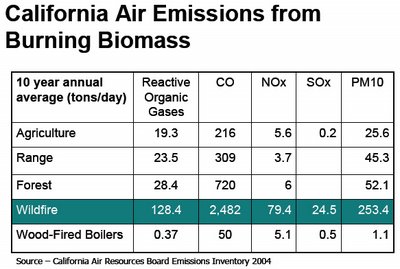Forest Industry: Bio-Solutions to Climate Change
 Is there an environmentally safe role for wood industry byproducts and waste to play in providing sustainable bio-solutions to climate change? Can we really live on less paper, pulp, and lumber? Are substitutes likely to be better environmentally - with equal or less impact on carbon sequestration? What is the responsible thing to do with tree trimmings, black liquor, and bark beetle-infested trees?
Is there an environmentally safe role for wood industry byproducts and waste to play in providing sustainable bio-solutions to climate change? Can we really live on less paper, pulp, and lumber? Are substitutes likely to be better environmentally - with equal or less impact on carbon sequestration? What is the responsible thing to do with tree trimmings, black liquor, and bark beetle-infested trees?
Does "saving forests" include thinning them to prevent forest fires - a horrific source of toxic carbon emissions and particulate matter (see below)? 
These are some of the questions that are being asked at Forestry Industry meetings like the International Seminar on Energy and Forest Products Industry (30-31 October) held in Rome.
The forest products industry is a major consumer of energy, using 6 percent of total industrial energy use in 2003. But the industry also produces energy, as well as other by-products that can be used for energy generation. It is the only sector that already generates approximately 50 percent of its own energy needs, the majority from renewable carbon-neutral biomass. Energy costs, energy supply and climate change are amongst the core issues impacting on the future of the forest products industry.
Wulf Killmann, Director of Forest Products and Economics at Food and Agriculture Organization (FAO), said that the potential of the forestry industry to help solve energy and climate change needs to be tapped. "Governments have a key role to play in encouraging industries to use cleaner and more efficient energy technologies and in promoting bio-energy."
Here are excerpts from a recent article published by Forest Newswatch:
--------------------
Can the forest products industry be part of a bio-solution to climate change?
Forest Newswatch (subscription)
Friday, 03 November 2006
The global forest products industry can play a significant role in combating climate change by optimizing the use of raw material, increasing efficiency, producing bio-energy and expanding into bio-refinery products while developing the competitiveness of the sector.
This was the conclusion of the International Seminar on Energy and Forest Products Industry (30-31 October), in which intergovernmental and private sector organisations of the global forest product industry joined forces. Participants stressed that well integrated and carefully balanced energy and forest policies around the globe set the stage for these developments. Governments, industry, institutions and society at large each have a role to play and should work together.
"The forest products industry can be part of the solution for climate change if committed to technological changes and energy efficiency," said Neil Hirst, Director of Energy Technology of the International Energy Agency (IEA). "It has the exceptional ability to become a net supplier of a range of energy products and it could, in combination with carbon capture and storage, become an important actor in removing carbon dioxide from the atmosphere."
"Wood and paper products are uniquely renewable and recyclable products that help reducing greenhouse gas emissions by absorbing carbon dioxide from the atmosphere," said Teresa Presas, Chair of the International Council of Forest and Paper Associations (ICFPA). The industry is committed to innovative energy solutions that meet the challenge of climate change, increase efficiency, reduce reliance on fossil fuel and expand the use of renewable energy sources. The industry believes that fibre from sustainable managed forests makes a positive contribution to the world's future energy supply.
"To achieve this", Presas said, "the industry needs enabling policies that support research and innovation, promote demonstration projects and improve the investment climate, specifically in this sector. Moreover there needs to be a level playing field between energy and non-energy uses of wood, considering that all this has to take place within the boundaries of sustainable forest management."
The World Wide Fund for Nature (WWF) would be glad to see the global forest product industry taking a stronger role in the energy and climate change mitigation field, but also sets some requirements.
"WWF considers that sustainable bioenergy has to be part of the global strategy to reduce greenhouse gas emissions, among other measures aiming to reduce the ecological footprint. Credible certification of bioenergy feedstocks with a focus on social and environmental issues - including greenhouse gas calculations - and land use planning are part of the solution to ensure the sustainability of development", said Duncan Pollard, Director of the WWF Forests for Life Programme.
technorati wood, feedstock, conversion, biofuels, biorefineries, ethanol, cellulosic, forests, fires



No comments:
Post a Comment